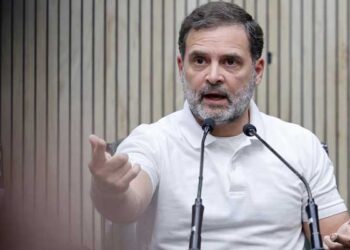- Officials report that among the deceased is a child.
- Military personnel were deployed following a high court directive.
- 118 individuals have been detained, and 15 police officers sustained injuries.
KOLKATA: In response to violent protests in West Bengal regarding new legislation affecting the management of Muslim-owned properties, Indian authorities deployed military forces.
On Friday, police resorted to using tear gas against thousands of protesters in Murshidabad district. Officials confirmed to AFP on Saturday that three individuals, including a child, lost their lives.
“Currently, we have arrested 118 individuals linked to the unrest,” stated Jawed Shamim, a senior police officer in the area, noting that at least 15 officers have been injured.
This deployment of federal troops came at the directive of the state’s high court.
The protests were ignited by the passage of the Waqf Amendment Bill earlier this month, following intense debate.
India features nearly two dozen Waqf boards managing approximately 900,000 acres of land, representing a multi-billion dollar asset portfolio, positioning them among the nation’s largest landowners, alongside the railways and armed forces.
Minister of Parliamentary Affairs Kiren Rijiju, who introduced the bill on Wednesday, claimed it would address issues of corruption and mismanagement.
Amit Shah, the Home Minister and a close ally of Prime Minister Modi, asserted that the amendments would help identify those leasing properties for personal profit. “Funds that could benefit minority communities are being siphoned off,” he remarked.
As stipulated by the new legislation, non-Muslims will participate in the Waqf boards exclusively in “administrative” roles. However, opposition factions allege that the government is engaging in “divisive politics” at the cost of India’s Muslim minority of roughly 200 million.
The ruling Hindu nationalist administration argues that the changes will promote transparency in land management by holding influential Waqf boards accountable for properties awarded through Muslim charitable endowments.
Opposition leaders, on the other hand, have labeled the bill a divisive “assault” on India’s Muslim community, accusing Prime Minister Narendra Modi’s Bharatiya Janata Party (BJP) of seeking to curry favor with its right-wing Hindu supports.
After the bill’s approval, Modi referred to it as a “historic turning point.”
Rahul Gandhi, head of the opposition Congress Party, criticized the legislation, suggesting that it targets Muslims now but could set a troubling precedent for future actions against other communities.
During Modi’s decade in power, he has fostered a reputation as a staunch advocate for the country’s Hindu majority, having previously revoked the special status of the Muslim-majority Jammu and Kashmir region and endorsed the construction of a temple on the site where a mosque stood for centuries until it was demolished by Hindu extremists in 1992.





